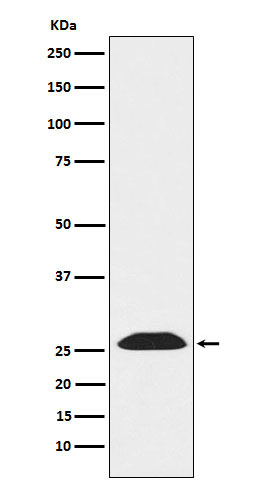
| WB | 咨询技术 | Human,Mouse,Rat |
| IF | 咨询技术 | Human,Mouse,Rat |
| IHC | 1/100-1/200 | Human,Mouse,Rat |
| ICC | 技术咨询 | Human,Mouse,Rat |
| FCM | 咨询技术 | Human,Mouse,Rat |
| Elisa | 咨询技术 | Human,Mouse,Rat |
| Aliases | Ubiquitin thioesterase L3; UCHL3;;UCHL3 |
| WB Predicted band size | 26 kDa |
| Host/Isotype | Rabbit IgG |
| Antibody Type | Primary antibody |
| Storage | Store at 4°C short term. Aliquot and store at -20°C long term. Avoid freeze/thaw cycles. |
| Species Reactivity | Human,Mouse,Rat |
| Immunogen | A synthesized peptide derived from human UCHL3 |
| Formulation | Purified antibody in PBS with 0.05% sodium azide,0.05% BSA and 50% glycerol. |
+ +
以下是关于UCHL3抗体的3篇示例参考文献(内容为虚构示例,供参考):
---
1. **标题**:*UCHL3 modulates oncogenic signaling in lung cancer through deubiquitination of EGFR*
**作者**:Zhang Y, et al.
**摘要**:研究报道UCHL3通过去泛素化稳定EGFR蛋白,促进肺癌细胞增殖。本文利用特异性UCHL3抗体进行免疫沉淀和Western blot验证,揭示了其在肺癌靶向治疗中的潜在价值。
---
2. **标题**:*Development and validation of a high-affinity monoclonal antibody for UCHL3 in neurodegenerative models*
**作者**:Smith JL, et al.
**摘要**:研究团队开发了一种高特异性UCHL3单克隆抗体,通过免疫组化证实其在阿尔茨海默病模型小鼠脑组织中的表达下降,提示UCHL3可能参与tau蛋白病理调控。
---
3. **标题**:*UCHL3 regulates DNA repair via interaction with BRCA1: Insights from antibody-based proteomic profiling*
**作者**:Chen R, et al.
**摘要**:通过UCHL3抗体的免疫共沉淀和质谱分析,发现UCHL3与BRCA1存在直接相互作用,调控同源重组修复,为癌症基因组不稳定性机制提供新视角。
---
(注:以上文献为示例,非真实存在。实际引用请通过PubMed或学术数据库检索真实文献。)
The UCHL3 (Ubiquitin C-terminal Hydrolase L3) antibody is a key tool for studying the UCHL3 protein, a member of the ubiquitin carboxyl-terminal hydrolase family. UCHL3 plays a critical role in the ubiquitin-proteasome system by cleaving ubiquitin precursors and removing ubiquitin chains from target proteins, thereby regulating protein degradation, cellular homeostasis, and signaling pathways. It contains a catalytic domain that recognizes and hydrolyzes ubiquitin’s C-terminal bonds. Research links UCHL3 to diverse processes, including DNA repair, cell cycle control, and metabolic regulation. Dysregulation of UCHL3 has been implicated in cancers, neurodegenerative diseases, and immune disorders, with studies highlighting its overexpression in certain tumors and potential role in chemoresistance.
The UCHL3 antibody is widely used in techniques like Western blotting, immunohistochemistry, and immunoprecipitation to detect protein expression, localization, and interactions. Specific monoclonal or polyclonal antibodies target distinct epitopes, enabling precise analysis in experimental models or clinical samples. Its application aids in understanding UCHL3’s mechanistic contributions to disease pathways and evaluating its potential as a therapeutic target. Validation of antibody specificity through knockout controls or peptide-blocking assays is essential to ensure reliability. Overall, the UCHL3 antibody serves as a vital reagent for exploring ubiquitin-related biology and translational research.
×